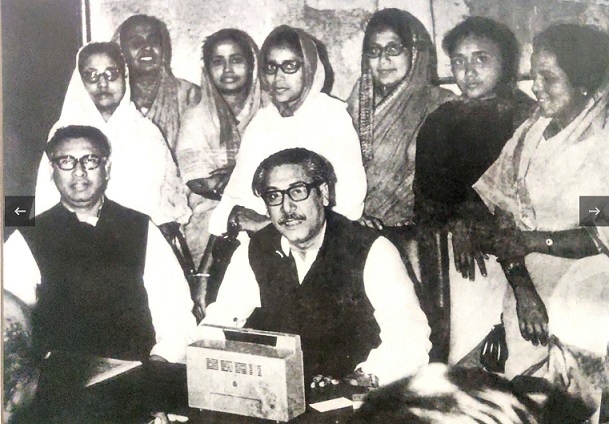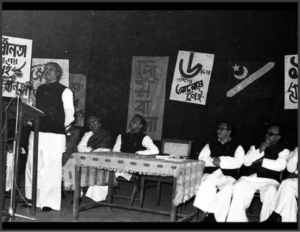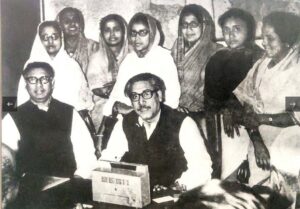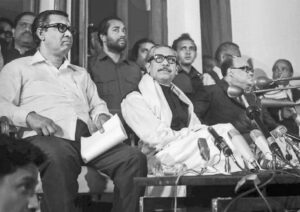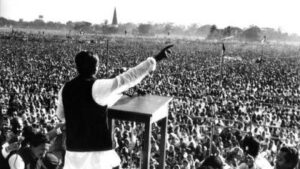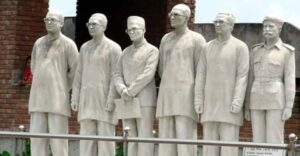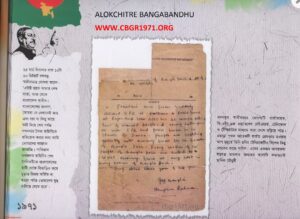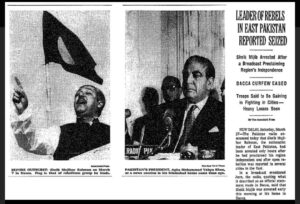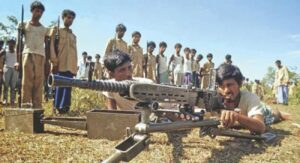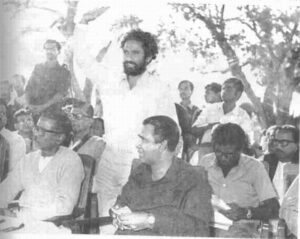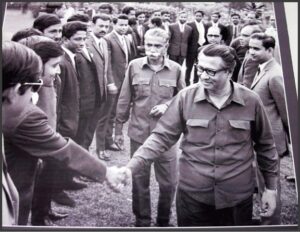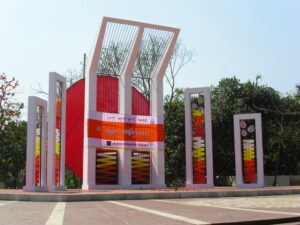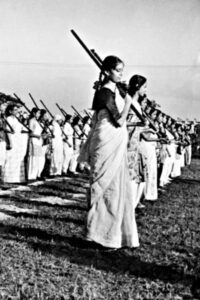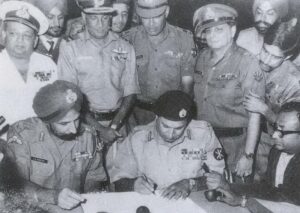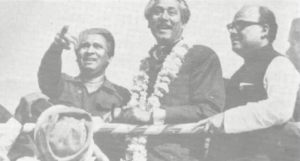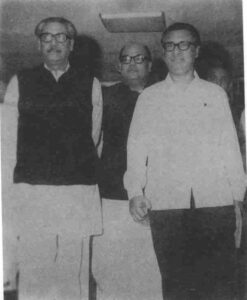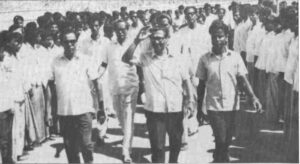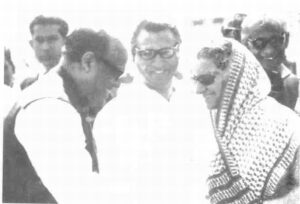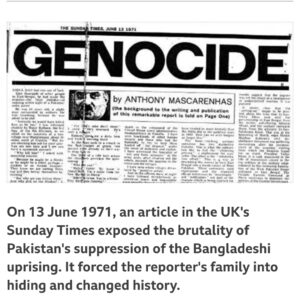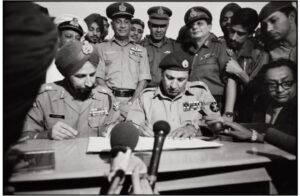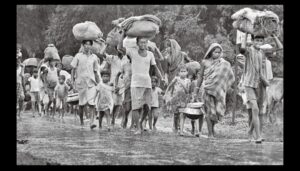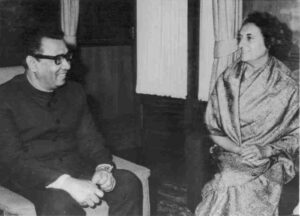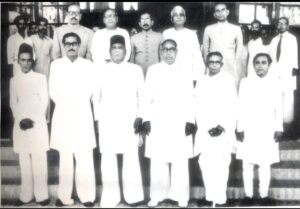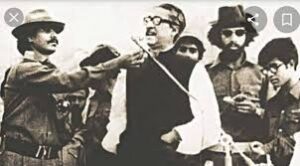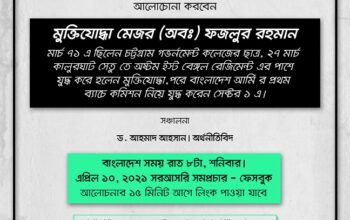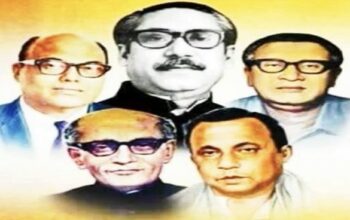Bangladesh’s Struggle for Independence had a long path.
- 1948 Opposing Jinnah to make Urdu alone the state language of Pakistan
- 1952 Language Movement
- 1969 non-cooperation movement
- Six-Point Autonomy Demand
- 1970 Election massive win by Awami League allowing it form central government alone
- Mar 1, 1971 Parliament Session Postponed depriving Awami League to form the government
- Mar 7, 1971 Bangabandhu’s historic Speech at Race Course, Dhaka
- Mar 25, 1971 night massive Pakistan Army crackdown on Bangalis and start of genocide
- Mar 26, 1971 Bangabandhu’s Declaration of Independence
- Nine month long Liberation War by Mukti Bahini against Pakistan Army and its cohorts in the country
- Dec 3-Dec15, 1971 India Pakistan War
- Dec 16, 1971 Surrender of Pakistan Army to India and the Bangladesh Liberation Forces in Dhaka
March 7 – This Day in Bangladesh Liberation War – Thus spoke Mujib Event analysis, Daily Star, Mar 7, 2021
6-Points Demand summary by Sharmin Ahmad
6-Points Demand History – by Sharmin Ahmad, excerpts from Neta O’ Pita
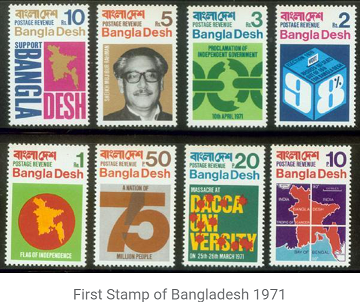
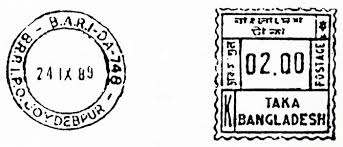
1947-1971 pictorial history
Sequence of history 1948-1971; the quotes are from Bangabandhu’s “Unfinished Memoirs”.
- March 24, 1948: Jinnah declares at a meeting at the Curzon Hall in Dhaka University: “Urdu and Urdu alone shall be the state language of Pakistan”. Students protest against this, saying “No, No!”.
- June 23, 1949: Awami Muslim League formed in Dhaka. It later changes its name to Awami League.
“They had contacted me for my views on the matter. I told them, ‘There is no point in pursuing the Muslim League any longer. This party has now become the establishment. We shouldn’t become part of the Muslim League even if they invite us to join them. This is because they now operate through coteries. They can no longer be called a party of the people. They have no policy at all.’ They also wanted to find out from me whether I would like to continue to work in the student front or join the political organization they were thinking of creating. This was because if we didn’t form an organization that could take on the role of the opposition this country would turn into a dictatorship.”
3. February 21, 1952: Language martyrs give their lives
“I remained in the hospital while all this was happening. One night Mohammad Toaha and Oli Ahad came to meet me, sneaking in through a window of my cabin that opened into a ward. I had told them to meet me after 1 a.m. I had also told them that I would like to talk to Khaleque Nawaz, Kazi Golam Mahbub and a few other Student League leaders. My door was being guarded by IB people but at this hour of the night most of them would be asleep. This was when five to seven of them came to meet me. I used to walk by myself till late at night. Since no one used to visit me then they allowed me to walk on my own. The police would lie down quietly knowing that I wasn’t going to run away. The detective branch people tended to nod off to sleep. We could therefore talk in the veranda. I told them that we should form an all-party united front. The Awami League leaders had already been informed. The Student League was the only student organization with a following at this time. The Student League leaders agreed to my proposal. Oli Ahad and Toaha declared that the Youth League would also agree to it. There was a conspiracy afoot to thwart the demand for establishing Bengali as the state language. Now if there was no protest the National Assembly would introduce legislation to make Urdu the only state language. Mr Nazimuddin had not only talked about making Urdu the only state language, he had also come up with many new arguments to buttress its claim. Although Oli Ahad wasn’t a member either of the Awami League or the Students’ League he was very fond of me and respected my views. I told him, ‘I’ve come to know that they are going to send me back to jail soon since they believe that I’ve been busy politically in the hospital. Come again to meet me tomorrow night.’ I also asked for a couple of other Students’ League leaders to meet me then. I wanted Shawkat Mia and a few other Awami League workers to be there too. The next night all these people came to see me one after the other. We decided in the meetings in my room to observe 21 February as State Language Day and to form a committee that day to conduct the movement to establish Bengali as the state language.”
…….
“I began to believe that no one could shut us up anymore. There was no way out for them except to make Bengali our state language. People had responded enthusiastically to the movement for Bengali and had come forward to join it. Some religious leaders had issued religious decrees against Bengali. But they had become frightened. They could no longer say anything against Bengali in the open. Public opinion had been mobilized, and oppressors are always afraid of public opinion. When rulers become oppressors or assist them the country and its people are bound to suffer.”
Bangabandhu marching with Bhashani on February 21, 1953 (first anniversary of the killing of students)
- March 1954: United Front sweeps election to East Bengal legislature on a 21-point election manifesto. Muslim League government falls and A. K. Fazlul Huq becomes Chief Minister. His government is arbitrarily dismissed a month later. One of the 21 points talks about autonomy for East Bengal.
“Rarely had the ruling party of a country been humiliated in this manner anywhere in the world. That ordinary Bengalis are knowledgeable about politics and are very conscious of the political situation was once again proven in this election. They had demonstrated their sensitivity to politics earlier in the elections held in 1946 to decide the Pakistan issue. In this election many prominent leaders of the Muslim League, including some members of the National Assembly, not only lost their seats but also had to forfeit their deposits. The prime minister of East Bengal, Mr Nurul Amin, was defeated. The results bewildered the ruling coterie and high-ranking bureaucrats. Nevertheless, they did not abandon hope of holding on to power. They now tried to adopt new strategies and began to hatch all sorts of conspiracies.”
Sheikh Mujib campaigning with Suhrawardy during 1954 elections
Sheikh Mujib took oath as Minister in the 1954 United Front government.
- September 1956: A group of Bengali economists articulate the concept of Two Economies in a report on the draft First Five-Year Plan for Pakistan.
Two economies thesis – road to the six points program
- February 5, 1966: Sheikh Mujibur Rahman articulates, for the first time, the six-points demand at a meeting in Lahore. He is arrested in May 1966.
- January 1968, Sheikh Mujibur Rahman implicated in Agartala Conspiracy Case.
- February 22, 1969: Agartala Conspiracy Case is withdrawn, and Sheikh Mujibur Rahman is freed. The next day, at a public meeting at the Race Course Maidan (now Suhrawardy Uddyan) in Dhaka, Sheikh Mujibur Rahman is bestowed the titled “Bangabandhu”.
- November 11, 1970: Devastating cyclone hits Bhola.
- December 7, 1970: Elections held to Pakistan National Assembly: Awami League wins all but two seats in East Pakistan, giving it a majority in the Pakistan parliament to form the government alone
- Mar 1, 1971: Parliament Session Postponed depriving Awami League to form the government
- Mar 7, 1971: Bangabandhu’s historic Speech at Race Course, Dhaka
- Mar 25, 1971: Pakistan Army crackdown on Bangalis and start of genocide
- Mar 26, 1971: Bangabandhu’s Declaration of Independence
- Mar 26-Dec 16,1971: Nine month long Liberation War by Mukti Bahini against Pakistan Army
- Dec 3-Dec15, 1971: India Pakistan War
- Dec 16, 1971: Surrender of Pakistan Army to India and the Bangladesh Liberation Forces in Dhaka
- Jan 10, 1972: Bangabandhu returns to Dhaka after release from Prison in Pakistan

